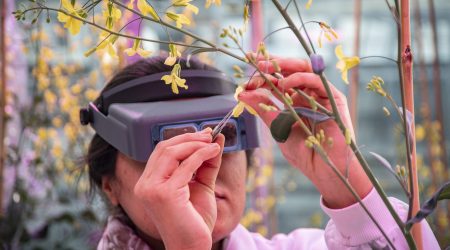Research into pathogen-host manipulation inspires major European Funding

A high-level scientific investigation on virulence factors of bacterial pathogens known as phytoplasmas has been awarded prestigious European Research Council (ERC) funding.
The funding will further long-term investigations by the team of Professor Saskia Hogenhout at the John Innes Centre, on how the virulence proteins, named SAPs, modulate plant processes to promote colonization by the bacteria and their insect vectors.
The five-year project called SAP-ERASER is an ambitious high-risk/high-gain program to deliver a radically novel Targeted Protein Degradation (TPD) technology.
The project won an ERC Advanced Grant which support excellent, established research scientists and scholars in any field.
“The project enables us to investigate the mode of action of SAP virulence factors and opens up unprecedented opportunities for a new TPD technology,” said Professor Hogenhout.
SAP factors hijack the proteasome, the machinery inside cells that breaks down proteins that are no longer needed. SAP factors cause proteins that are important to growth and development to be effectively dumped.
TPD technologies have recently emerged as one of the hottest areas in drug discovery, because of their potential for specifically degrading and eliminating any disease-causing protein, such as those involved in cancers and neurodegenerative disorders.
SAP-ERASER will look into the application of TPD technology for removing unwanted proteins that cause plant, animal and human diseases.
Professor Hogenhout said: “Throughout my career I have worked on insect-vectored pathogens like phytoplasmas. I was inspired by the opportunities that arose from SAPs unique mode of action and the sense of urgency brought on by global health and environmental challenges.”
The project offers the opportunity for a unique protein knock-down technology with many applications in biotechnology and biomedicine that complement existing gene knock-down tools.
Uncovering technologies like these is critical if we are to meet the threat of many human, animal and plant diseases.
“I am delighted to hear that Professor Hogenhout has been awarded an ERC Advanced Grant. This is a clear example of how fundamental research can lead to unexpected and wide ranging applications” said Professor Dale Sanders FRS, Director of the John Innes Centre.
Professor Hogenhout is one of 253 scientists from across Europe to receive ERC Advanced Grants for 2021, sharing funding worth in total €624.6 million. Funding is up to €2.5 million per grant.
President of the ERC Prof. Maria Leptin commented: “Congratulations to the new grant winners in the latest round of ERC Advanced Grants! By following their scientific curiosity, these senior researchers are pushing the frontiers of our knowledge in a wide range of fields. It’s essential to fund this type of cutting-edge research to keep Europe at the scientific forefront.”
The programme is titled, SAP-ERASER – Targeted Protein Degradation using SAP effectors.
About the ERC
The ERC, set up by the European Union in 2007, is the premier European funding organisation for excellent frontier research. It funds creative researchers of any nationality and age, to run projects based across Europe. The ERC offers four core grant schemes: Starting Grants, Consolidator Grants, Advanced Grants and Synergy Grants. With its additional Proof of Concept Grant scheme, the ERC helps grantees to bridge the gap between their pioneering research and early phases of its commercialisation. The ERC is led by an independent governing body, the Scientific Council. Since 1 November 2021, Maria Leptin is the President of the ERC. The overall ERC budget from 2021 to 2027 is more than €16 billion, as part of the Horizon Europe programme, under the responsibility of the European Commissioner for Innovation, Research, Culture, Education and Youth, Mariya Gabriel.
ERC press contacts
Marcin Mońko – Press and Communication adviser. Phone: +32 (0)2 296 66 44
Eilish Brault – Press and Communication adviser. Phone: +32 (0) 29 52471



